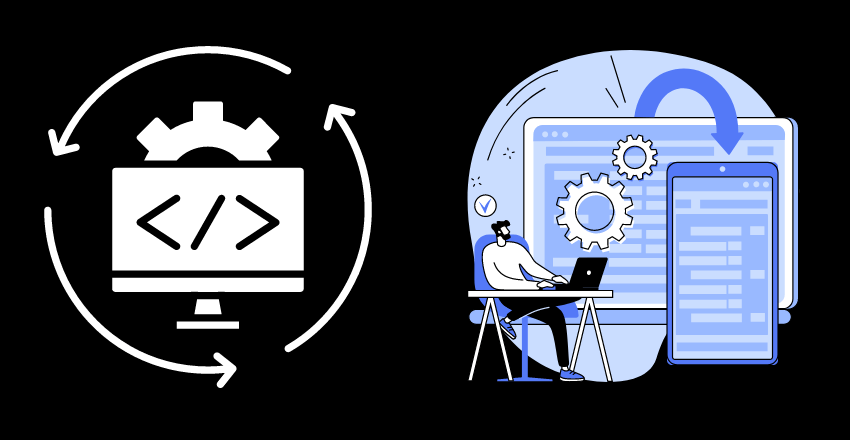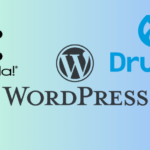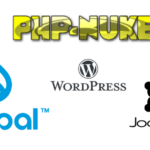
If you’re a PHP developer looking to enhance your coding efficiency and streamline your development process, then you’ve come to the right place. In this article, we’ll be discussing the strategies and tools you need to embrace DevOps in your PHP development projects.
DevOps is a set of practices that combines software development and IT operations to improve collaboration, communication, and automation within the development process. Implementing DevOps practices in your PHP development projects can result in faster release cycles, improved code quality, and reduced development costs.
So, if you’re ready to take your PHP development to the next level, let’s explore the world of DevOps for PHP Developers.
Understanding DevOps in PHP Development
As a PHP developer, implementing DevOps practices can greatly enhance your workflow and improve the quality of your code. DevOps is a set of practices that combines software development and operations to improve collaboration, communication, and automation throughout the development process.
The core principles of DevOps include continuous integration, continuous delivery, and continuous deployment. By following these principles, PHP developers can streamline their development process and reduce the likelihood of errors or bugs in their code.
However, implementing DevOps in PHP development can be challenging. PHP developers may face specific obstacles, such as the need to support different versions of PHP and the use of different PHP frameworks. To overcome these challenges, PHP developers can adopt strategies such as using version control, implementing automated testing, and creating modular code.
Key DevOps Practices for PHP Developers
Here are some DevOps practices that PHP developers can implement to enhance their workflow:
- Use version control systems such as Git to manage code changes and collaborate with team members effectively.
- Implement automated testing to catch errors and bugs early in the development process.
- Create modular code that is easy to maintain and update.
- Monitor your application’s performance regularly to ensure its stability and reliability.
- Automate deployment processes to speed up the release cycle and reduce the likelihood of errors.
By implementing these practices, PHP developers can improve the efficiency and productivity of their development process and deliver high-quality code consistently.
Streamlining the PHP Development Process with DevOps
DevOps practices have immense potential in streamlining the PHP development process, increasing efficiency, and boosting productivity. However, integrating DevOps into PHP coding requires careful planning, execution, and management to ensure optimal results.
Here are some best practices to integrate DevOps into PHP development workflow:
1. Automate the Build Process
Automating the build process is critical for streamlining PHP development and ensuring efficient deployment. DevOps automation tools enable PHP developers to automate the build process and ensure that it is error-free, resulting in faster and more scalable releases.
2. Implement Continuous Integration and Deployment (CI/CD)
CI/CD ensures that PHP code changes are integrated, tested, and deployed in an automated and predictable manner. This minimizes the risk of errors and significantly reduces the development cycle time. PHP developers can use CI/CD tools to automate testing, code analysis, and deployment, making the process more efficient.
3. Containerize PHP Applications
Containerization is a DevOps practice that enables developers to package and deploy PHP applications in a standardized format, making it easier to manage dependencies and isolate applications. Containerization automates application deployment and provides scalability by allowing PHP developers to deploy applications across different environments consistently.
4. Use Microservices Architecture
A microservices architecture enables developers to create and deploy small, independent PHP services that can be managed separately. This architecture improves the scalability and flexibility of PHP applications, where each microservice is designed for a specific function and can be updated or replaced without impacting other services.
5. Monitor Applications with DevOps Tools
DevOps tools provide real-time monitoring and metrics for PHP applications, enabling developers to identify issues and resolve them quickly. A range of DevOps monitoring tools are available that can be integrated into PHP development workflow to provide insights into performance and availability.
Integrating DevOps into PHP development workflow is a continuous process, requiring collaboration, communication, and continuous improvement. The above best practices can help PHP developers streamline their development process and boost productivity for better application delivery.
Essential DevOps Tools for PHP Developers
DevOps tools are essential in streamlining the development process for PHP developers. These tools help automate repetitive tasks, increase efficiency, and enhance collaboration among team members. Here are some popular DevOps tools that are specifically useful for PHP developers:
| Tool | Description |
|---|---|
| Git | A distributed version control system that allows for efficient code management and collaboration among team members. |
| Jenkins | An open-source automation server that enables continuous integration and continuous deployment (CI/CD) of PHP applications. |
| Docker | A containerization platform that simplifies the process of deploying and managing PHP applications in different environments. |
| PHPUnit | A unit testing framework for PHP that helps ensure the quality and stability of code. |
| Ansible | An IT automation tool that simplifies the deployment and management of PHP applications across different servers. |
| Graylog | A log management platform that provides real-time visibility into PHP application logs, enabling developers to identify and troubleshoot issues quickly. |
These are just a few examples of the many DevOps tools available for PHP developers. The key is to choose the tools that best suit your needs and integrate them seamlessly into your development workflow.
Continuous Integration and Deployment in PHP Projects

Continuous integration and deployment are critical components of DevOps for PHP development. They ensure that changes to the codebase are integrated and tested frequently, allowing for rapid iteration and delivery of new features.
By automating the integration and deployment processes, PHP developers can save time and reduce the risk of errors and inconsistencies. This allows for more frequent releases and a faster time-to-market.
There are several tools available that can help streamline the continuous integration and deployment processes for PHP development, including:
| Tool | Purpose |
|---|---|
| GitLab CI/CD | Provides a complete continuous integration and deployment platform that’s tightly integrated with GitLab, a popular code repository and collaboration tool. |
| Travis CI | Offers an easy-to-use, cloud-based continuous integration platform that integrates with GitHub and other popular code repositories. |
| Jenkins | A highly customizable, open-source continuous integration platform that offers a wide range of plugins and integrations with other tools. |
Regardless of the tool used, it’s important to establish a consistent and reliable process for integration and deployment. This includes setting up automated tests, establishing code review processes, and defining clear deployment pipelines.
By implementing continuous integration and deployment in their PHP projects, developers can ensure that code changes are integrated and tested frequently, leading to a more stable and reliable application. It also enables faster delivery of new features and fixes, ultimately improving the user experience.
Collaboration and Communication in DevOps for PHP Developers

Collaboration and communication are essential components of DevOps for PHP development projects. A cohesive and organized team can make all the difference in delivering high-quality PHP applications on time and within budget. Fortunately, there are many collaboration and communication tools available that can help PHP development teams work together more effectively.
Slack is a popular communication tool that helps team members stay connected and share ideas in real-time. Teams can create public and private channels for specific projects or topics, making it easy to separate conversations and avoid clutter. Slack also integrates with other tools, such as GitHub and Jira, for seamless collaboration.
Zoom is another collaboration tool that is particularly useful for remote teams. Teams can use Zoom to hold virtual meetings, share screens, and collaborate on code in real-time. The tool also offers features such as recording and transcription, making it easy for team members who couldn’t attend a meeting to catch up on what they missed.
In addition to communication tools, there are other collaboration platforms that can help PHP development teams work more efficiently. Basecamp, for example, is a project management tool that allows teams to organize tasks, deadlines, and milestones in one centralized location. Teams can also use Basecamp to collaborate on files and documents, share progress updates, and communicate with clients.
Finally, it’s essential to establish clear communication channels within the team. Regular stand-up meetings, for instance, can help keep everyone on the same page, while also providing a platform for team members to voice their concerns and ideas. Instant messaging apps, such as Telegram, can also be helpful for quick updates and informal conversations between team members.
Monitoring and Testing in PHP DevOps
One of the key benefits of implementing DevOps practices in PHP development is the ability to streamline the monitoring and testing process. With a range of monitoring tools and testing automation frameworks available, DevOps can enhance the quality and stability of PHP applications.
PHP Monitoring Tools
There are several popular monitoring tools that PHP developers can integrate into their DevOps workflow. These include:
| Tool Name | Description |
|---|---|
| New Relic | A powerful application performance monitoring tool that provides real-time insights into PHP application performance. |
| AppDynamics | A comprehensive application monitoring platform that offers deep visibility into PHP application performance, database performance, and more. |
| Zenoss | A network and server monitoring tool that can be used to monitor PHP applications running on multiple servers. |
By integrating these monitoring tools into their DevOps workflow, PHP developers can gain a better understanding of how their applications are performing and identify potential issues before they become major problems.
PHP Testing Automation
Testing is another important area where DevOps can make a significant difference in PHP development. By automating testing processes, developers can save time and ensure that code changes are thoroughly tested before being deployed.
There are several testing frameworks that are commonly used in PHP development. These include:
- PHPUnit: A popular testing framework that is specifically designed for PHP development. It allows developers to write unit tests to validate code changes.
- Codeception: A full-stack testing framework that supports both unit testing and acceptance testing. It can be used to test PHP applications from end-to-end.
- Behat: A behavior-driven testing framework that allows developers to write tests in plain English. This can make testing more accessible to non-technical members of the team.
By integrating these testing frameworks into their DevOps workflow, PHP developers can automate the testing process and ensure that their applications are thoroughly tested before being deployed to production.
Overall, monitoring and testing are critical components of DevOps for PHP developers. By leveraging monitoring tools and testing automation frameworks, developers can enhance the quality and stability of their PHP applications.
Security Considerations in DevOps for PHP Development
Security is a critical concern in any software development project, and PHP development is no exception. DevOps practices can help PHP developers incorporate security measures throughout the development process. Here are some PHP security best practices to consider when implementing DevOps:
- Secure coding practices: Train developers to write secure code from the outset, using frameworks such as OWASP PHP to avoid common vulnerabilities like SQL injection and cross-site scripting attacks.
- Regular vulnerability scans: Use automated tools like OWASP ZAP and Acunetix to scan code and detect potential security threats.
- Code reviews: Conduct code reviews to catch security issues early on, ensuring that developers adhere to established secure coding practices.
- Secure deployment: Use secure channels like SSL/TLS to encrypt data transmissions during deployment, while also ensuring that access to production servers is tightly controlled using private keys and other security measures.
- Secure communication: Use secure channels for communication among team members, such as encrypted messaging applications and VPNs to protect sensitive information.
- Automated testing: Use testing frameworks like PHPUnit and Behat to automate testing and ensure that security measures are effectively integrated into the DevOps workflow.
By incorporating these best practices into their DevOps approach, PHP developers can reduce the risk of security breaches and ensure the safety and stability of their applications.
Examples: Successful DevOps Implementation in PHP Projects
Real-world examples of companies or projects that have successfully implemented DevOps in PHP development can help you understand the benefits and challenges of using DevOps in your projects. Let’s take a look at some PHP DevOps case studies:
Example 1: Etsy
Etsy, the popular online marketplace, has been using DevOps practices to manage their microservices architecture for years. The company’s DevOps team has built a custom platform that allows developers to quickly and easily deploy new code changes to production. This has enabled Etsy to release new features and updates multiple times a day, leading to increased customer satisfaction and faster time to market.
Example 2: Slack
Slack, the messaging and collaboration platform, has a sophisticated DevOps infrastructure that allows them to manage continuous deployment of their PHP applications. The company’s DevOps team has implemented a range of tools and processes to ensure code quality, including automated testing, continuous integration, and code reviews. This has helped Slack to maintain reliability and stability for their users.
Example 3: Calendly
Calendly, the scheduling software provider, has adopted DevOps practices to speed up their development process and improve their product quality. The company’s DevOps team has implemented automated testing and deployment tools to reduce manual errors and speed up the feedback loop. This has enabled Calendly to release new features and updates quickly, resulting in increased customer satisfaction.
These DevOps success stories demonstrate the power of implementing DevOps practices in PHP development. By embracing DevOps, companies can improve their coding efficiency, streamline their development process, and ultimately achieve better outcomes for their PHP projects.
Recap: Embrace DevOps to Excel in PHP Development

In today’s fast-paced and ever-changing technology landscape, PHP developers face a multitude of challenges, from keeping up with new innovations to meeting tight project deadlines. However, by adopting DevOps practices, PHP developers can enhance their coding efficiency, streamline their development process and ultimately excel in their PHP projects.
DevOps practices can have numerous benefits for PHP development teams, including increased collaboration, faster time-to-market, improved quality and greater agility. By embracing a DevOps approach, PHP developers can optimize their workflow, automate repetitive tasks, and ensure that their code is always up-to-date and compliant with industry standards.
FAQs

Q: What is DevOps?
A: DevOps emphasizes collaboration between teams, streamlining software development and enhancing delivery quality.
Q: Why is DevOps important for PHP development?
A: DevOps boosts PHP development efficiency, addressing deployment, consistency, and team collaboration challenges.
Q: What are the benefits of implementing DevOps practices in PHP development?
A: DevOps in PHP development enhances software delivery, collaboration, reliability, and adapts to project needs.
Q: How can DevOps principles be applied to PHP development?
A: DevOps introduces automation, continuous integration, fostering collaboration in PHP development for quality code.
Q: What are some best practices for integrating DevOps into the PHP development workflow?
A: Integrate DevOps in PHP workflow with automation, version control, continuous integration, and team collaboration.
Q: What are some essential DevOps tools for PHP developers?
A: DevOps toolsfor PHP: Git, Jenkins, Docker, Ansible, New Relic.
Q: How can continuous integration and deployment benefit PHP projects?
A: Continuous integration and deployment automate PHP projects for faster feedback, early issue detection, and stability.
Q: What are some collaboration and communication tools for PHP development teams?
A: For PHP teams: Jira, Trello, Slack, Microsoft Teams, Bitbucket, GitHub enhance collaboration and communication.
Q: What are some monitoring tools and testing frameworks for PHP DevOps?
A: PHP DevOps tools: Nagios, Datadog for monitoring; PHPUnit, Behat for testing; Selenium, Cypress for browser tests.
Q: What security considerations should PHP developers be aware of when implementing DevOps strategies?
A: In PHP DevOps, prioritize secure coding, access control, data security, and vulnerability assessments.
Q: Can you provide some examples of successful DevOps implementation in PHP projects?
A: Several companies or projects have successfully implemented DevOps in PHP development. For example, company XYZ streamlined their deployment process and reduced the time between code changes and deployment by 50%. Another project implemented a continuous integration pipeline which resulted in a significant reduction in bugs and improved overall code quality.
Q: Why should PHP developers embrace DevOps practices?
A: PHP developers should adopt DevOps for efficiency, faster software delivery, and application stability.
Ashley is an esteemed technical author specializing in scientific computer science. With a distinguished background as a developer and team manager at Deloit and Cognizant Group, they have showcased exceptional leadership skills and technical expertise in delivering successful projects.
As a technical author, Ashley remains committed to staying at the forefront of emerging technologies and driving innovation in scientific computer science. Their expertise in PHP web development, coupled with their experience as a developer and team manager, positions them as a valuable resource for professionals seeking guidance and best practices. With each publication, Ashley strives to empower readers, inspire creativity, and propel the field of scientific computer science forward.







